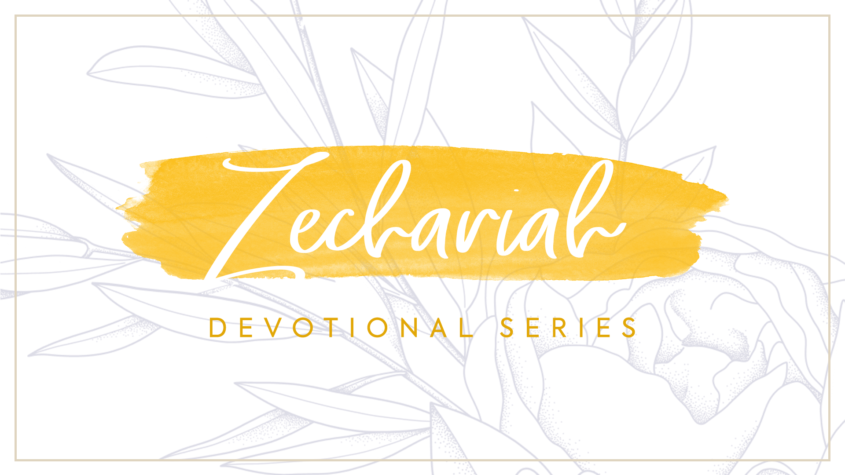DEVOTIONAL
As we continue reading in Zechariah, the conversation repeats language of the flock and shepherds which is new for this book, but we see similar language all throughout the Bible. In today’s passage, the flock refers to Judah and Israel that are God’s chosen people. The shepherds are the ones leading them either on the path to God or away from God. What I learn reading Zechariah 10-11 is that the health of the flock is a direct reflection of the shepherd. Even though I am not a farmer by any sense of the word, I am confident farmers would agree with that assessment too.
When you read today’s passage, did you notice the contrast between the two chapters? God communicates through Zechariah in chapter 10 the plan to restore Judah and Israel along with the motivation for why God wants to restore them. Then, the next chapter is about how God destroys the shepherds for leading the flock away from God and unfortunately how the flock reject a good shepherd that tries to lead the flock to God. Thankfully, the story does not end with the flock wandering aimlessly without hope. Before we jump to the end, let’s take a closer look at what is happening in Zechariah 10.
Remember how the people of God were scattered in exile? God is ready to gather his flock back home from the south in Egypt and north in Assyria. God sees the leaders, or shepherds, over Judah and Israel are dependent on false gods and not Yahweh. The chapter starts by showing us the difference in verse one when we are dependent on Yahweh and verse two when we are dependent on all the lesser things. It stings to think about it, but we know it is true. When I place my hope for happiness, success, and health in things like people, promotions, or work outs the result is temporary or empty. However, the encouragement is in verse one. We find lasting joy when we depend on God because we acknowledge all things are made and sustained by him (Colossians 1:17). God sees the shepherds in the days of Zechariah are not good and decides it is time to intervene. The motivation for God to restore the flock comes in Zechariah 10:3 which says, “for the Lord of hosts cares for his flock.” God decides it is time to redeem the strength of the flock to better than they could imagine. The picture of compassion and redemption God has for his people encourages me that yes, God keeps his covenant and is worth depending on because God acts in ways that overwhelm.
So, what happens to the shepherds mentioned in Zechariah 10:3? God destroys them. Zechariah 11 opens with descriptions of strong cedar, oak, and cypress that represents the strength of the shepherds. They operate to build themselves strong and superior. The motivation of the shepherds is not to care for the flock like God. It is the opposite. They care for themselves. And what happens to the strongest cedar against a flame? It burns down. The same thing happens to the glory the shepherds build for themselves. It burns down. Now, the flock are without a shepherd. God tells Zechariah in verse four to become the good shepherd for the flock. In obedience, Zechariah becomes the shepherd with good intentions represented by the two staff “Favor” and “Union”. However, the flock reject the good shepherd. Is this a foreshadow of how Jesus is rejected? Maybe. Zechariah breaks the staff of Favor and Union to abandon the flock to their waywardness.
It is like they circle back to where they were prior to the exile. Have we not learned anything in the past seventy years? The answer feels obvious. But, in my life when I am in the thick of waywardness, depending on all the lesser things, I do not recognize “oh yeah, God I’ve been here before”. Instead, I ask over and over “why am I so frustrated and unsettled?” Why do I lack peace? Like the flock in Zechariah 11, I am trying to shepherd myself or seeking all the wrong things to shepherd me. The chapter closes with a warning for the flock and worthless shepherds.
“For behold, I am raising up in the land a shepherd who does not care for those being destroyed, or seek the young or heal the maimed or nourish the healthy, but devours the flesh of the fat ones, tearing off even their hoofs. “Woe to my worthless shepherd, who deserts the flock! May the sword strike his arm and his right eye! Let his arm be wholly withered, his right eye utterly blinded!” – Zechariah 11:16-17
If I am not careful, I can fall into the culture of self-serving or comparison that could quickly devour me. Thankfully, God intervenes. God sees the worthless shepherd in the days of Zechariah and in our lives too. How does God respond? He burns them down. At the beginning, I said the story does not end with the flock wandering aimlessly. The hope is God intervenes by sending a good shepherd to redeem and care for the flock. This is a teaser for what is coming in the next chapter. May you spend time this week thanking God for being a good shepherd that we can wholly depend on for lasting joy.
Q: How has God cared for you this year? Where has God redeemed you in ways that overwhelm you?
Additional Reading: Psalm 100, Ezekiel 34, John 10
